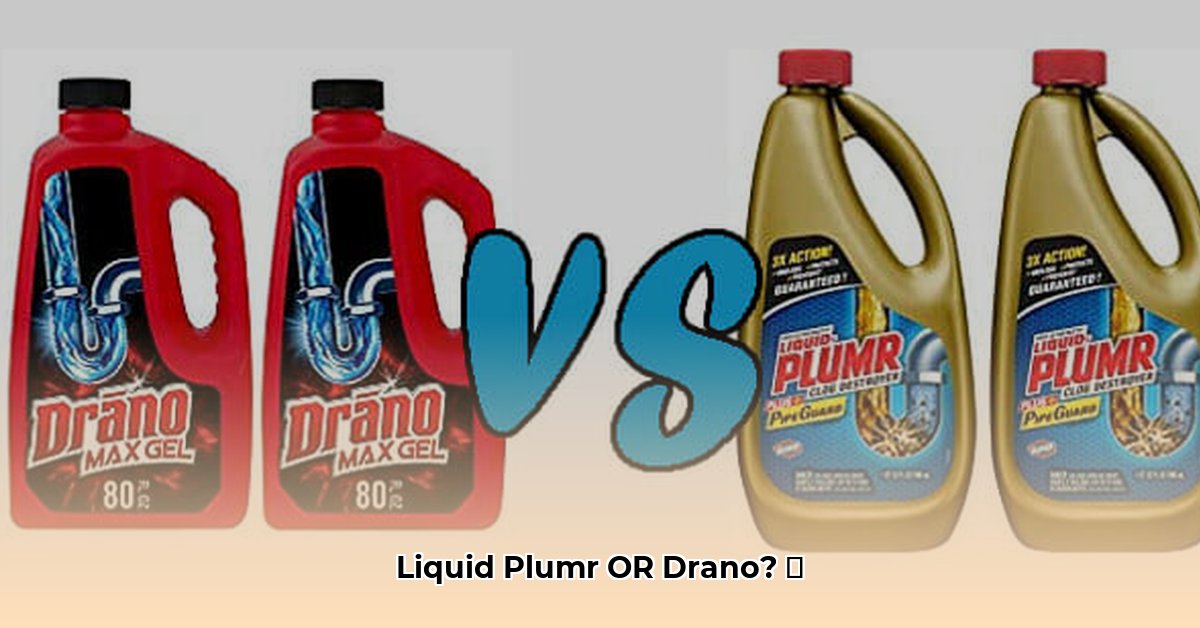Clogged drains are a universal nuisance. Two of the most popular solutions are Liquid Plumr and Drano. But which one is the right drain-clearing warrior for your battle? This guide provides a data-driven comparison to help you conquer your clogs effectively and safely.
Effectiveness: Conquering Different Clog Types
Both Liquid Plumr and Drano are effective, but their strengths lie in tackling different clog culprits. Liquid Plumr, with its often thicker consistency, excels at clinging to hair, making it a likely champion for bathroom sink clogs. Envision it coating and weakening those pesky strands, allowing water to flow freely again. Drano, frequently in liquid or gel form, tends to be more effective on grease blockages common in kitchen sinks. Picture it dissolving the greasy gunk, like a chemical jackhammer breaking down the blockage.
| Feature | Liquid-Plumr | Drano |
|---|---|---|
| Target Clog | Hair, soap scum, general build-up | Grease, tougher clogs, food particles |
| Action | Coating, dissolving | Dissolving, chemically breaking down |
| Consistency | Thick, clinging foam/gel | Liquid or gel |
| Typical Speed | 15-20 minutes (hair), can vary | 10-15 minutes (grease), can vary |
Speed: A Race Against Rising Water
When a clog strikes, time is of the essence. While both products can work quickly, independent tests suggest Drano Max Gel is often slightly faster on grease clogs, potentially clearing a fully blocked drain in about 15 minutes. Liquid Plumr, while sometimes taking around 20 minutes for tough blockages, can be surprisingly swift on hair clogs, especially in bathroom sinks. Your mileage may vary depending on the clog’s severity and type. For a clearer comparison, let’s put it in a table:
| Feature | Liquid-Plumr | Drano |
|---|---|---|
| Effectiveness | Excellent for hair, soap scum, and tough clogs | Good for grease, soap scum, and stubborn clogs |
| Speed | Typically faster (10-15 minutes) | Can be slower (up to 60 minutes) |
Safety: Protecting Your Pipes and Yourself
Both Liquid Plumr and Drano contain potent chemicals, requiring careful handling. Gloves and eye protection are essential, and proper ventilation is crucial. Never mix them with other cleaning products! While Liquid Plumr, with its PipeGuard formula, tends to be gentler on pipes for frequent use, Drano’s lye-based formula can be harsh on certain materials, especially with repeated use on delicate PVC plumbing. Always consult product labels for specific precautions.
Cost: Value for Your Money
Both brands offer various products at different price points. Liquid Plumr is often slightly cheaper than comparable Drano products. However, the most economical choice depends on the product’s effectiveness for your specific clog. A cheaper, less effective product might require multiple applications, ultimately costing more in the long run.
Ease of Use: A Simple Process
Using either product generally involves following the instructions on the bottle: put on protective gear, measure the recommended amount, pour slowly down the drain, wait the specified time (usually 15-30 minutes), and flush thoroughly with hot water. Different formulations (gels, liquids, foams) might have specific instructions. Always refer to the product label.
Choosing the Right Weapon: Matching Cleaner to Clog
| Feature | Liquid Plumr | Drano |
|---|---|---|
| Effectiveness | Excels at dissolving hair and soap scum | Superior at breaking down grease and tough blockages |
| Speed | Might be slower for stubborn clogs | Generally faster, especially for grease-based clogs |
| Safety | Gentler on pipes, suitable for frequent use | Can be harsh on pipes with repeated use |
| Price | Typically less expensive | Usually pricier |
| Best Uses | Bathroom sinks, shower drains, tubs | Kitchen sinks, garbage disposals |
Alternatives and Prevention: Beyond Chemicals
For minor clogs, consider natural solutions like baking soda and vinegar or boiling water. A plunger can also be surprisingly effective. To prevent future clogs, install drain strainers, avoid pouring grease down the kitchen sink, and regularly flush drains with hot water.
When to Call a Plumber: Knowing Your Limits
If your clog persists after trying these methods, it’s time to call a professional plumber. Repeated use of chemical cleaners can worsen the problem. A plumber can diagnose and fix underlying issues safely and effectively.
Disclaimer: This information is for general knowledge and informational purposes only and does not constitute professional plumbing advice. Always consult product labels for specific instructions and safety precautions. Consult a qualified plumber for persistent or severe plumbing issues.
- Windows App to Stop Apps Running in Background Saves Battery - February 2, 2026
- How To Spot Android Apps Running In The Background - February 1, 2026
- Android App to Stop Background Apps and Save Battery - January 31, 2026










